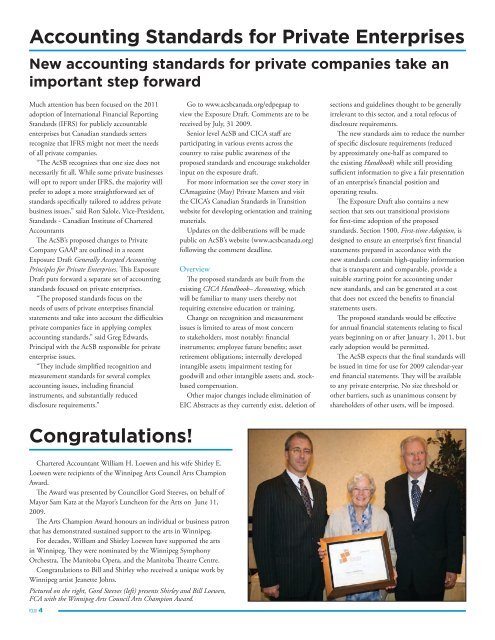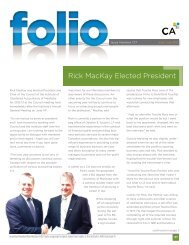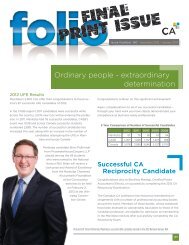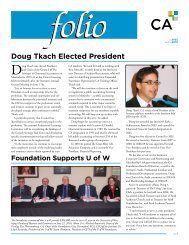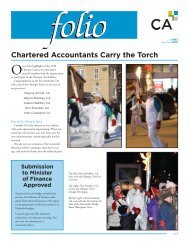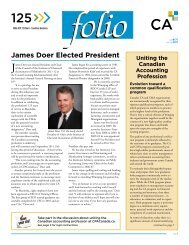Ian Seymour Elected President - The Institute of Chartered ...
Ian Seymour Elected President - The Institute of Chartered ...
Ian Seymour Elected President - The Institute of Chartered ...
Create successful ePaper yourself
Turn your PDF publications into a flip-book with our unique Google optimized e-Paper software.
Accounting Standards for Private Enterprises<br />
New accounting standards for private companies take an<br />
important step forward<br />
Much attention has been focused on the 2011<br />
adoption <strong>of</strong> International Financial Reporting<br />
Standards (IFRS) for publicly accountable<br />
enterprises but Canadian standards setters<br />
recognize that IFRS might not meet the needs<br />
<strong>of</strong> all private companies.<br />
“<strong>The</strong> AcSB recognizes that one size does not<br />
necessarily fit all. While some private businesses<br />
will opt to report under IFRS, the majority will<br />
prefer to adopt a more straightforward set <strong>of</strong><br />
standards specifically tailored to address private<br />
business issues,” said Ron Salole, Vice-<strong>President</strong>,<br />
Standards - Canadian <strong>Institute</strong> <strong>of</strong> <strong>Chartered</strong><br />
Accountants<br />
<strong>The</strong> AcSB’s proposed changes to Private<br />
Company GAAP are outlined in a recent<br />
Exposure Draft Generally Accepted Accounting<br />
Principles for Private Enterprises. This Exposure<br />
Draft puts forward a separate set <strong>of</strong> accounting<br />
standards focused on private enterprises.<br />
“<strong>The</strong> proposed standards focus on the<br />
needs <strong>of</strong> users <strong>of</strong> private enterprises financial<br />
statements and take into account the difficulties<br />
private companies face in applying complex<br />
accounting standards,” said Greg Edwards,<br />
Principal with the AcSB responsible for private<br />
enterprise issues.<br />
“<strong>The</strong>y include simplified recognition and<br />
measurement standards for several complex<br />
accounting issues, including financial<br />
instruments, and substantially reduced<br />
disclosure requirements.”<br />
Congratulations!<br />
<strong>Chartered</strong> Accountant William H. Loewen and his wife Shirley E.<br />
Loewen were recipients <strong>of</strong> the Winnipeg Arts Council Arts Champion<br />
Award.<br />
<strong>The</strong> Award was presented by Councillor Gord Steeves, on behalf <strong>of</strong><br />
Mayor Sam Katz at the Mayor’s Luncheon for the Arts on June 11,<br />
2009.<br />
<strong>The</strong> Arts Champion Award honours an individual or business patron<br />
that has demonstrated sustained support to the arts in Winnipeg.<br />
For decades, William and Shirley Loewen have supported the arts<br />
in Winnipeg. <strong>The</strong>y were nominated by the Winnipeg Symphony<br />
Orchestra, <strong>The</strong> Manitoba Opera, and the Manitoba <strong>The</strong>atre Centre.<br />
Congratulations to Bill and Shirley who received a unique work by<br />
Winnipeg artist Jeanette Johns.<br />
Pictured on the right, Gord Steeves (left) presents Shirley and Bill Loewen,<br />
FCA with the Winnipeg Arts Council Arts Champion Award.<br />
FOLIO 4<br />
Go to www.acsbcanada.org/edpegaap to<br />
view the Exposure Draft. Comments are to be<br />
received by July, 31 2009.<br />
Senior level AcSB and CICA staff are<br />
participating in various events across the<br />
country to raise public awareness <strong>of</strong> the<br />
proposed standards and encourage stakeholder<br />
input on the exposure draft.<br />
For more information see the cover story in<br />
CAmagazine (May) Private Matters and visit<br />
the CICA’s Canadian Standards in Transition<br />
website for developing orientation and training<br />
materials.<br />
Updates on the deliberations will be made<br />
public on AcSB’s website (www.acsbcanada.org)<br />
following the comment deadline.<br />
Overview<br />
<strong>The</strong> proposed standards are built from the<br />
existing CICA Handbook– Accounting, which<br />
will be familiar to many users thereby not<br />
requiring extensive education or training.<br />
Change on recognition and measurement<br />
issues is limited to areas <strong>of</strong> most concern<br />
to stakeholders, most notably: financial<br />
instruments; employee future benefits; asset<br />
retirement obligations; internally developed<br />
intangible assets; impairment testing for<br />
goodwill and other intangible assets; and, stockbased<br />
compensation.<br />
Other major changes include elimination <strong>of</strong><br />
EIC Abstracts as they currently exist, deletion <strong>of</strong><br />
sections and guidelines thought to be generally<br />
irrelevant to this sector, and a total refocus <strong>of</strong><br />
disclosure requirements.<br />
<strong>The</strong> new standards aim to reduce the number<br />
<strong>of</strong> specific disclosure requirements (reduced<br />
by approximately one-half as compared to<br />
the existing Handbook) while still providing<br />
sufficient information to give a fair presentation<br />
<strong>of</strong> an enterprise’s financial position and<br />
operating results.<br />
<strong>The</strong> Exposure Draft also contains a new<br />
section that sets out transitional provisions<br />
for first-time adoption <strong>of</strong> the proposed<br />
standards. Section 1500, First-time Adoption, is<br />
designed to ensure an enterprise’s first financial<br />
statements prepared in accordance with the<br />
new standards contain high-quality information<br />
that is transparent and comparable, provide a<br />
suitable starting point for accounting under<br />
new standards, and can be generated at a cost<br />
that does not exceed the benefits to financial<br />
statements users.<br />
<strong>The</strong> proposed standards would be effective<br />
for annual financial statements relating to fiscal<br />
years beginning on or after January 1, 2011, but<br />
early adoption would be permitted.<br />
<strong>The</strong> AcSB expects that the final standards will<br />
be issued in time for use for 2009 calendar-year<br />
end financial statements. <strong>The</strong>y will be available<br />
to any private enterprise. No size threshold or<br />
other barriers, such as unanimous consent by<br />
shareholders <strong>of</strong> other users, will be imposed.


